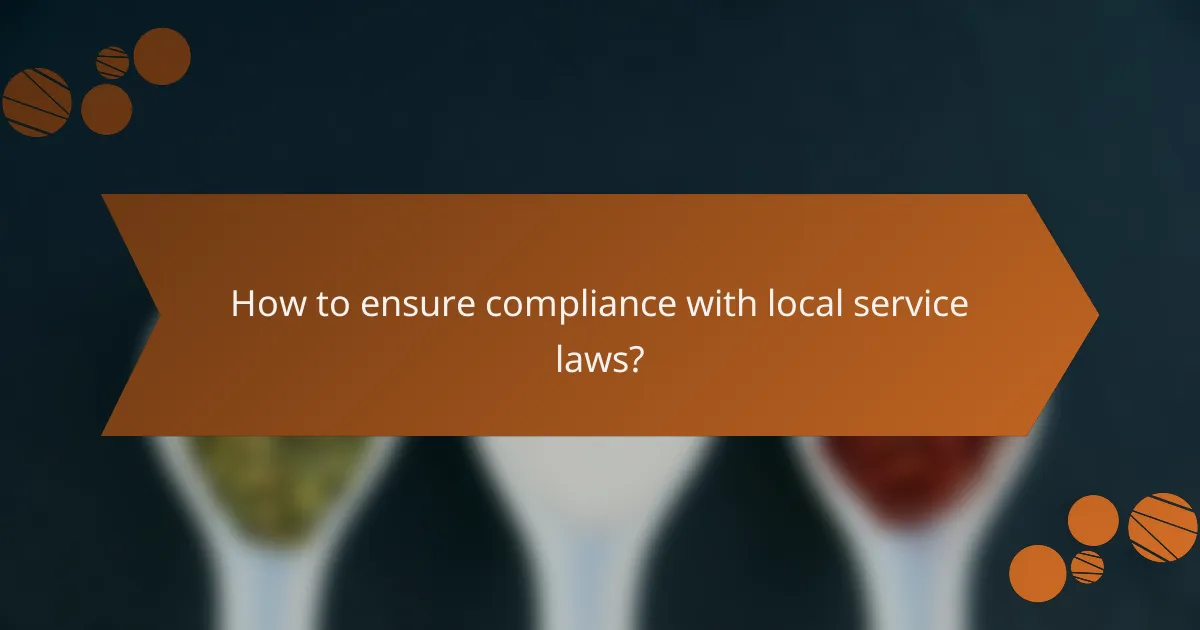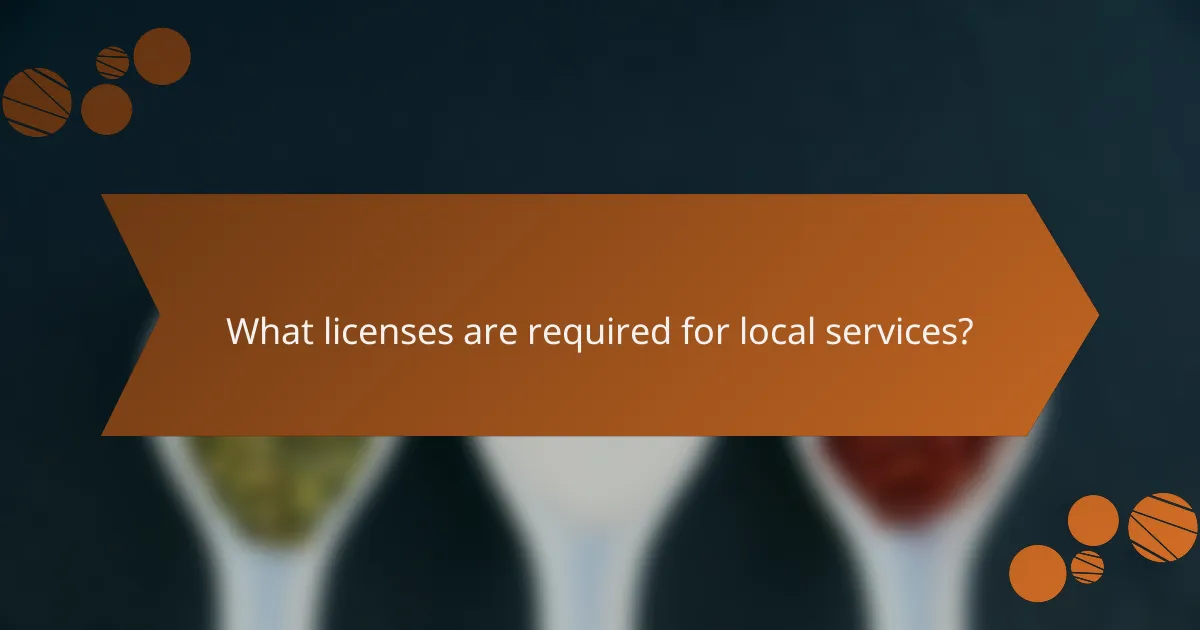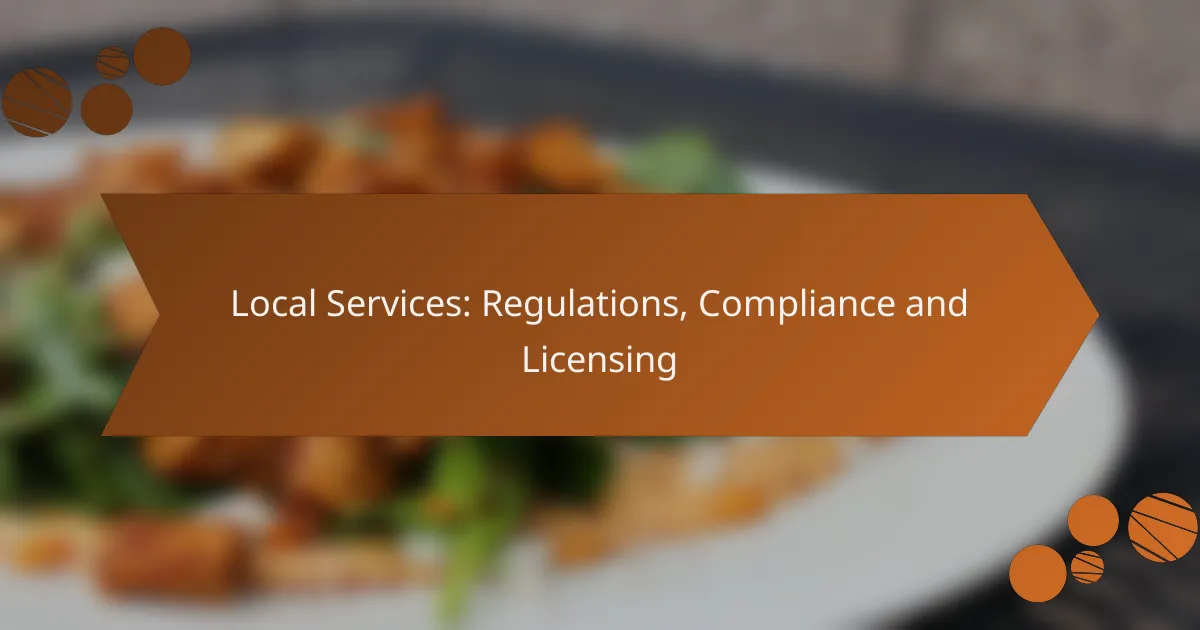Understanding local service regulations is crucial for businesses operating in California, as they encompass licensing, permits, and health codes designed to ensure safety and legality. Compliance with these regulations requires businesses to stay informed about industry-specific requirements, conduct regular assessments, and maintain thorough records to avoid legal complications. Proper licensing is essential, as the types of licenses needed can differ significantly based on the service provided and the location of the business.

What are the local service regulations in California?
Local service regulations in California encompass a variety of requirements that businesses must adhere to, including licensing, permits, and health codes. These regulations ensure that services are provided safely and legally within the state.
State licensing requirements
In California, many service industries require state licenses to operate legally. For example, contractors, cosmetologists, and healthcare providers must obtain specific licenses issued by state boards or agencies. The application process typically involves submitting proof of qualifications, passing exams, and paying applicable fees.
It’s crucial to verify the specific licensing requirements for your industry, as they can vary significantly. Failing to obtain the necessary licenses can result in penalties, fines, or even business closure.
Local permits and zoning laws
Local permits and zoning laws dictate where and how businesses can operate within a community. Each city or county in California may have its own set of regulations that determine the types of services allowed in specific areas. For instance, a business may need a conditional use permit to operate in a residential zone.
Before starting a service business, check with your local planning department to understand zoning restrictions and obtain any necessary permits. This step can prevent costly delays or legal issues down the line.
Health and safety codes
Health and safety codes in California set standards to protect public health and ensure safe service delivery. These codes cover various aspects, including sanitation, employee safety, and customer protection. For example, food service businesses must comply with strict health regulations enforced by local health departments.
Regular inspections may be conducted to ensure compliance with these codes. It’s essential to stay informed about the relevant health and safety regulations for your specific service to avoid violations and maintain a good reputation.

How to ensure compliance with local service laws?
To ensure compliance with local service laws, businesses must understand and adhere to regulations specific to their industry and location. This involves regular assessments, employee education, and meticulous record-keeping to avoid legal issues and maintain operational integrity.
Regular audits and inspections
Conducting regular audits and inspections is crucial for maintaining compliance with local service laws. These evaluations help identify potential areas of non-compliance and ensure that operations align with regulatory standards. Schedule audits at least annually, but consider more frequent checks if your industry is heavily regulated.
During audits, focus on key areas such as safety protocols, service quality, and adherence to local laws. Utilize checklists to streamline the process and ensure all relevant aspects are covered. Engaging third-party auditors can provide an unbiased perspective and highlight areas for improvement.
Employee training programs
Implementing comprehensive employee training programs is essential for compliance with local service laws. Training should cover relevant regulations, company policies, and best practices to ensure all staff members understand their responsibilities. Regular refresher courses can help keep employees updated on any changes in laws or procedures.
Consider tailoring training sessions to specific roles within the organization, as different positions may face unique compliance challenges. Encourage a culture of compliance by fostering open communication and providing resources for employees to ask questions or report concerns.
Documentation and record-keeping
Effective documentation and record-keeping are vital for demonstrating compliance with local service laws. Maintain accurate records of all operations, including service transactions, employee training, and audit results. This documentation serves as evidence of compliance during inspections and can protect your business in case of disputes.
Establish a systematic approach to record-keeping, including digital storage solutions that allow for easy access and retrieval. Regularly review and update records to ensure they reflect current practices and regulations. Create a checklist of essential documents to maintain, such as licenses, permits, and employee training logs.

What licenses are required for local services?
Local services typically require various licenses to operate legally, ensuring compliance with local regulations. The specific licenses needed can vary based on the type of service, location, and industry standards.
Business operation licenses
Business operation licenses are essential for any local service provider. These licenses validate that a business is authorized to conduct operations within a specific jurisdiction. Depending on the locality, the application process may involve submitting documentation, paying fees, and passing inspections.
Common examples include general business licenses, which are often required for all businesses, and sector-specific licenses, such as those for restaurants or retail shops. It’s crucial to check with local government offices to understand the specific requirements and fees involved.
Specialized trade licenses
Specialized trade licenses are necessary for businesses that provide specific services, such as plumbing, electrical work, or cosmetology. These licenses ensure that service providers meet industry standards and possess the necessary skills and training to perform their work safely and effectively.
Obtaining a specialized trade license usually involves completing an accredited training program, passing an exam, and sometimes gaining practical experience. Local regulations may dictate the duration and nature of training required, so it’s important to verify these details with relevant authorities.
Environmental permits
Environmental permits are required for local services that may impact the environment, such as construction, waste management, or landscaping. These permits ensure that businesses comply with environmental regulations and minimize their ecological footprint.
The process for obtaining environmental permits often includes submitting an application that outlines the potential environmental impacts of the service, along with plans for mitigation. Local environmental agencies typically review these applications, and fees can vary widely based on the scope of the project and the specific regulations in place.

How to apply for local service licenses?
To apply for local service licenses, you typically need to follow a structured process that varies by jurisdiction. This involves submitting an application, providing necessary documentation, and paying applicable fees.
Application process overview
The application process for local service licenses generally begins with identifying the specific license required for your business type. Most jurisdictions have a dedicated office or online portal where you can submit your application.
After submitting your application, it may undergo a review process that includes background checks and compliance assessments. Be prepared for possible follow-up requests for additional information or clarification.
Required documentation
Common documentation required for local service licenses includes proof of identity, business registration documents, and any relevant certifications or qualifications. Depending on the service, you may also need to provide health and safety compliance certificates.
It’s advisable to check with your local licensing authority for a comprehensive list of required documents, as these can vary significantly by location and service type.
Fees and processing times
Fees for local service licenses can range from modest amounts to several hundred dollars, depending on the type of service and the jurisdiction. Processing times can also vary, typically ranging from a few days to several weeks.
To avoid delays, ensure that your application is complete and all required documents are submitted. Some jurisdictions offer expedited processing for an additional fee, which can be beneficial if you need the license quickly.

What are the consequences of non-compliance?
Non-compliance with local regulations can lead to serious consequences, including financial penalties and operational restrictions. Businesses must understand these risks to maintain their licenses and avoid disruptions.
Fines and penalties
Fines for non-compliance can vary widely depending on the nature of the violation and local laws. In many jurisdictions, fines can range from a few hundred to several thousand dollars, with some serious infractions leading to much higher penalties.
In addition to monetary fines, businesses may face increased scrutiny from regulatory bodies, which can lead to further compliance checks and potential costs. It is crucial to stay informed about the specific regulations that apply to your industry to avoid these financial repercussions.
License suspension or revocation
Non-compliance can result in the suspension or revocation of business licenses, which can halt operations entirely. This is particularly common in regulated industries such as healthcare, construction, and food services.
To mitigate the risk of losing a license, businesses should implement regular compliance audits and training for employees. Understanding the specific requirements for maintaining a license in your area can help prevent costly interruptions and ensure ongoing operations.
